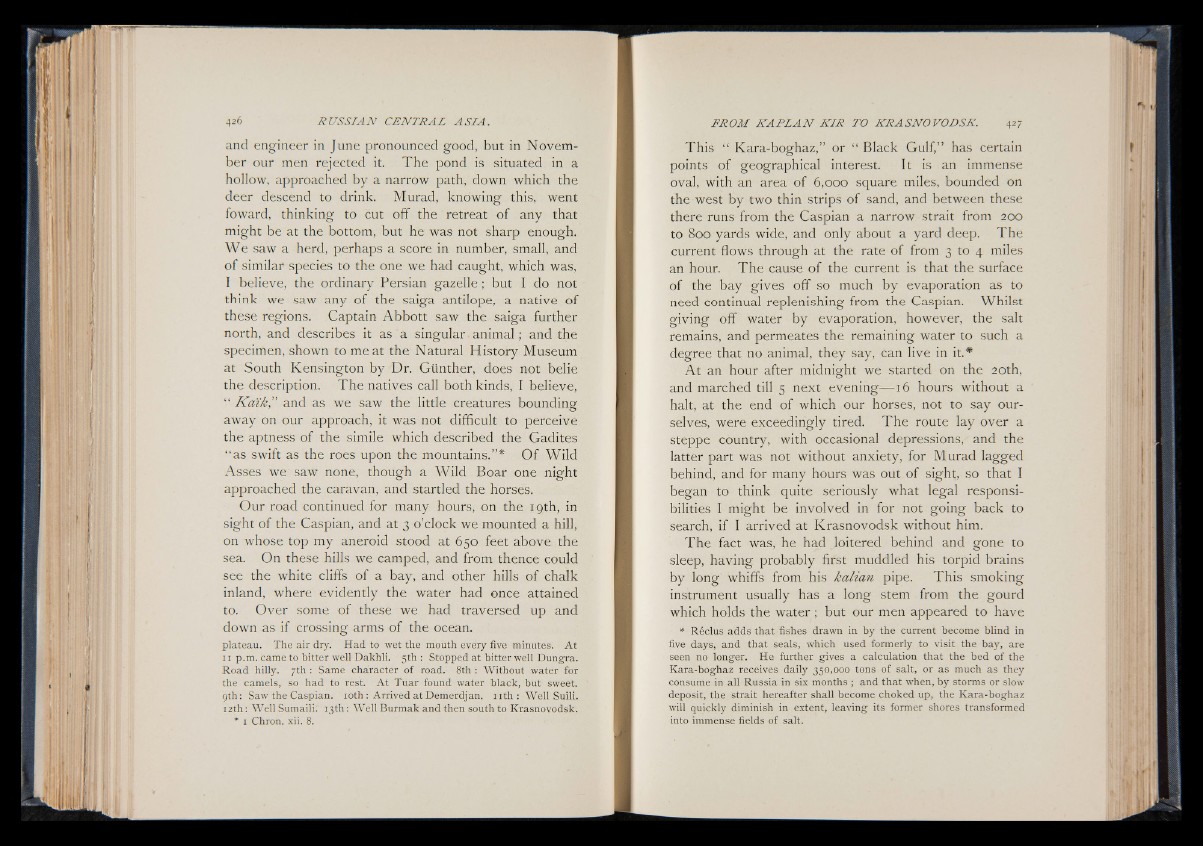
and engineer in June pronounced good, but in November
our men rejected it. The pond is situated in a
hollow, approached by a narrow path, down which the
deer descend to drink. Murad, knowing this, went
foward, thinking to cut off the retreat of any that
might be at the bottom, but he was not sharp enough.
We saw a herd, perhaps a score in number, small, and
of similar species to the one we had caught, which was,
I believe, the ordinary Persian ga ze lle ; but I do not
think we saw any of the saiga antilope, a native of
these regions. Captain Abbott saw the saiga further
north, and describes it as a singular animal; and the
specimen, shown to meat the Natural History Museum
at South Kensington by Dr. Gunther, does not belie
the description. The natives call both kinds, I believe*
“ K a i k and as we saw the little creatures bounding
away on our approach, it was not difficult to perceive
the aptness of the simile which described the Gadites
“ as swift as the roes upon the mountains.” * O f Wild
Asses we saw none, though a Wild Boar one night
approached the caravan, and startled the horses.
Our road continued for many hours, on the 19th, in
sight of the Caspian, and at 3 o’clock we mounted a hill,
on whose top my aneroid stood at 650 feet above the
sea. On these hills we camped, and from thence could
see the white cliffs of a bay, and other hills of chalk
inland, where evidently the water had once attained
to. Over some of these we had traversed up and
down as if crossing arms of the ocean,
plateau. The air dry. Had to wet the mouth every five minutes. At
II p.m. came to bitter well Dakhli. H i : Stopped at bitter well Dungra.
Road hilly. 7th : Same character of road. 8th : Without water for
the camels, so had to rest. At Tuar found water black, but sweet.
9th: Saw the Caspian. 10th : Arrived at Demerdjan. n th : Well Suili.
12th: WellSumailir 13th: Well Burmak and then south to Krasnovodsk.
* 1 Chron. xii. 8.
This “ Kara-boghaz,” or “ Black Gulf,” has certain
points of geographical interest. It is an immense
oval, with an area of 6,000 square miles, bounded on
the west by two thin strips of sand, and between these
there runs from the Caspian a narrow strait from 200
to 800 yards wide, and only about a yard deep. The
current flows through at the rate of from 3 to 4 miles
an hour. The cause of the current is that the surface
of the bay gives off so much by evaporation as to
need continual replenishing from the Caspian. Whilst
giving off water by evaporation, however, the salt
remains, and permeates the remaining water to such a
degree that no animal, they say, can live in it.*
A t an hour after midnight we started on the 20th,
and marched till 5 next evening— 16 hours without a
halt, at the end of which our horses, not to say ourselves,
were exceedingly tired. T h e route lay over a
steppe country, with occasional depressions, and the
latter part was not without anxiety, for Murad lagged
behind, and for many hours was out of sight, so that I
began to think quite seriously what legal responsibilities
I might be involved in for not going back to
search, if I arrived at Krasnovodsk without him.
The fact was, he had loitered behind and gone to
sleep, having probably first muddled his torpid brains
by long whiffs from his kalian pipe. This smoking
instrument usually has a long stem from the gourd
which holds the w a te r ; but our men appeared to have
* Reclus adds that fishes drawn in by the current become blind in
five days, and that seals, which used formerly to visit the bay, are
seen no longer. He further gives a calculation that the bed of the
Kara-boghaz receives daily 350,000 tons of salt, or as much as they
consume in all Russia in six months ; and that when, by storms or slow
deposit, the strait hereafter shall become choked up, the Kara-boghaz
will quickly diminish in extent, leaving its former shores transformed
into immense fields of salt.